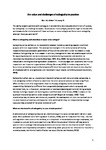The value and challenges of collegiality in practice
| dc.contributor.author | Burr, Steven | |
| dc.contributor.author | Collett, Tracey | |
| dc.contributor.author | Leung, YL | |
| dc.date.accessioned | 2017-11-30T12:35:57Z | |
| dc.date.available | 2017-11-30T12:35:57Z | |
| dc.date.issued | 2017-09-12 | |
| dc.identifier.issn | 1750-8460 | |
| dc.identifier.issn | 1759-7390 | |
| dc.identifier.uri | http://hdl.handle.net/10026.1/10350 | |
| dc.description.abstract |
The ability to work optimally with colleagues is considered to be a valuable determinant of success, but collegiality is a challenge to assess. Could you be more collegial, and what might be the benefits and drawbacks for clinical practice? How could you be more collegial and foster more collegiality amongst those you work with? What is collegiality and what does it mean to be collegial? Collegiality can be defined as the relationship between individuals working towards a common purpose within an organisation. The concept has its origins in the roman practice of sharing responsibility equally between government officials of the same rank in order to prevent a single individual from gaining too much power. In contrast, managerialism does not provide opportunities for exploring democratic consensus because it promotes being responsive and obedient to implementing the wishes of authority (Dearlove, 1997, King, 2004). Collegiality emphasises trust, independent thinking and sharing between co-workers. This encourages both autonomy and mutual respect and can impact on organisational efficacy (Donohoo, 2017). In modern day practice, the focus is less on sharing responsibility between officials of the same rank and more on ensuring that all employees within an organisation are treated with equal respect as individual people (Lorenzen, 2006). | |
| dc.format.extent | 486-487 | |
| dc.format.medium | ||
| dc.language | en | |
| dc.language.iso | en | |
| dc.publisher | Mark Allen Healthcare | |
| dc.subject | Attitude of Health Personnel | |
| dc.subject | Clinical Decision-Making | |
| dc.subject | Cooperative Behavior | |
| dc.subject | Humans | |
| dc.subject | Interpersonal Relations | |
| dc.subject | Intersectoral Collaboration | |
| dc.subject | Practice Patterns, Physicians' | |
| dc.title | The value and challenges of collegiality in practice | |
| dc.type | journal-article | |
| dc.type | Editorial | |
| plymouth.author-url | https://www.webofscience.com/api/gateway?GWVersion=2&SrcApp=PARTNER_APP&SrcAuth=LinksAMR&KeyUT=WOS:000410555800005&DestLinkType=FullRecord&DestApp=ALL_WOS&UsrCustomerID=11bb513d99f797142bcfeffcc58ea008 | |
| plymouth.issue | 9 | |
| plymouth.volume | 78 | |
| plymouth.publication-status | Published | |
| plymouth.journal | British Journal of Hospital Medicine | |
| dc.identifier.doi | 10.12968/hmed.2017.78.9.486 | |
| plymouth.organisational-group | /Plymouth | |
| plymouth.organisational-group | /Plymouth/Faculty of Health | |
| plymouth.organisational-group | /Plymouth/Faculty of Health/Peninsula Medical School | |
| plymouth.organisational-group | /Plymouth/Users by role | |
| plymouth.organisational-group | /Plymouth/Users by role/Academics | |
| dc.publisher.place | England | |
| dcterms.dateAccepted | 2017-06-20 | |
| dc.rights.embargodate | 2018-3-12 | |
| dc.identifier.eissn | 1759-7390 | |
| dc.rights.embargoperiod | Not known | |
| rioxxterms.versionofrecord | 10.12968/hmed.2017.78.9.486 | |
| rioxxterms.licenseref.uri | http://www.rioxx.net/licenses/all-rights-reserved | |
| rioxxterms.licenseref.startdate | 2017-09-12 | |
| rioxxterms.type | Journal Article/Review |


